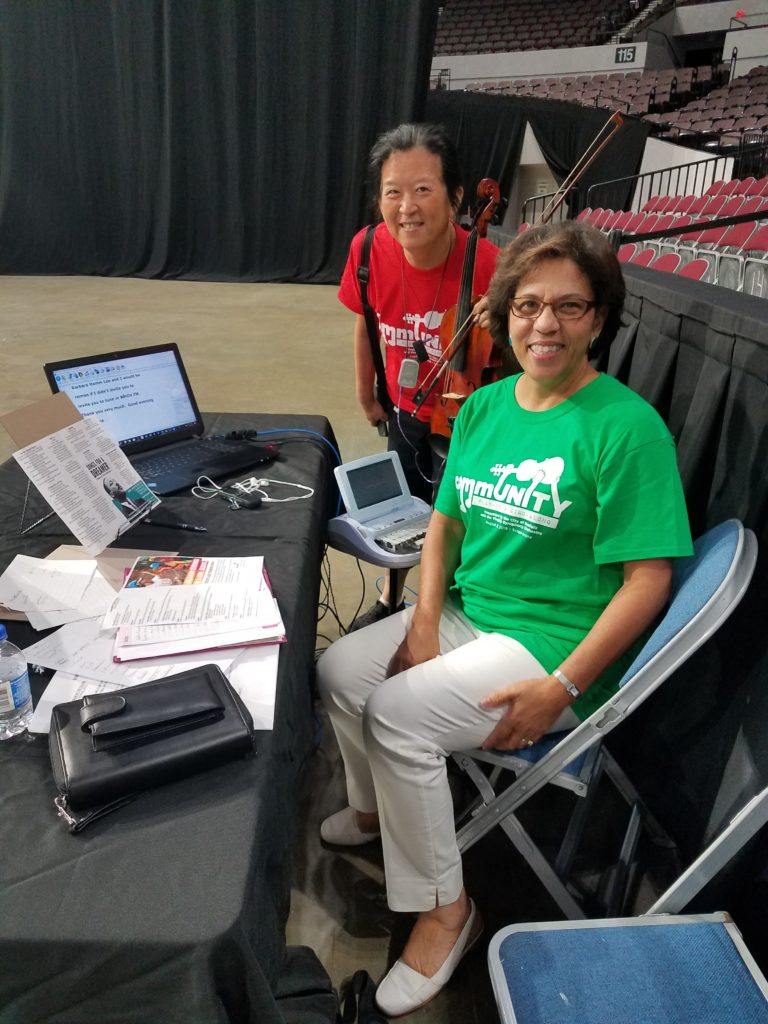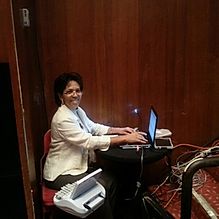
NCRA member Lois Boyle, RMR, owner of Boyle Reporting & Captioning Services in Newport News, Va., is also founder and executive director of Access Virginia, a nonprofit organization she created to provide open captioning and audio description at live theatrical performances. Through Access Virginia, members of the deaf and hard-of-hearing community and the visually impaired can attend performances and experience the wonder of live entertainment at public facilities. In addition to her professional career, running a business and a nonprofit, Boyle also finds time to volunteer at local school career days to help introduce students to the benefits of a career in court reporting or captioning. The JCR recently caught up with Boyle to learn more about what motivates her.
JCR | What prompted you to start Access Virginia, and when did you begin offering services?
LB | I established Access Virginia in 2014 to provide open captioning and CART at the performing arts theater for persons with hearing loss. I was prompted to start a non-profit organization so that anyone with a hearing loss could attend live theater and to ensure no person with this disability was treated any differently than anyone else.
I learned how to caption for theater in 2010 at the request of one client who lost her hearing profoundly at age 30, who loved the arts, had a degree in music, but had been locked out of the theater for 20 years because of lack of accommodation. She did not know ASL which is what the venues offered for persons with hearing loss, and that was upon request. Once I provided it for one person and the word spread, there was a demand for it, and I was contracted by the theater to provide the service for its Broadway series. In addition, Access Virginia has expanded to offer services of audio description for the blind/vision-loss community because of their desire to be included and attend events after hearing about the accommodations offered to the hearing loss community.
JCR | Does the organization provide services throughout Virginia or just in your region?
LB | Access Virginia provides services in the Hampton Roads region, and we have had requests to provide our services beyond Hampton Roads.
JCR | Are there plans to expand the area you provide services to?
LB | Yes. We have provided services as far as Abingdon, Va., at Barter Theater.
JCR | How do you fundraise to help support the organization?
LB | We fundraise through grants from city arts commissions, public donations, personal pledges, local entities such as the sheriff’s office and civic groups, churches, and foundations, and online fundraising. We also have an annual awareness and fundraising gala.
JCR | How has the response been from those you assist?
LB | The response from individuals who need such accommodations has been the driving force to continue to provide and advocate for such services. Testimonials have been: “I feel like a little girl again,” “You’re an angel,” “I saw Les Misérables four times, and this is the first time I’ve been able to enjoy the show because of captions.”
JCR | Do you have your own venue, or do you provide programming in various public places?
LB | We provide the services at four main venues in the Hampton Roads region: Chrysler Hall and Wells Theater in Norfolk, Ferguson Center for the Arts and Downing-Gross Cultural Arts Center in Newport News. We have provided our services at other local theaters but currently contract with these four.
JCR | How did you recruit your board members and staff?

LB | We recruit board members who have a connection to persons with disabilities or have expertise in the field because they can appreciate our cause and the necessity for it. We also have board members who have sensory disabilities.
JCR | Do you rely on all volunteer time to support this effort?
LB | We do have great volunteers and rely on them. We reach out to local colleges and volunteer organizations for support. But we do pay our service providers because of the amount of work/time it takes to prepare a script and for the use of their equipment. We have four court reporters who open caption with us. Though the plays are scripted and formatted, we do use our real-time skillset to caption live pre- and post-show announcements and in-theater workshops.
JCR | How do you advertise?
LB | We advertise on our website, accessvirginia.info; on social media, mainly Facebook, Instagram, and Twitter. We have a newsletter that goes out once a month with the upcoming shows, fliers at various locations, presentations at civic clubs, and, of course, word of mouth.
JCR | Do you have specific partner organizations you work with?
LB | Yes, we partner with Virginia Stage Company in Norfolk to conduct drama workshops for the deaf and hard-of-hearing, as well as Dramatically Able, which is a sensory theater program for students with vision loss. We also partner with Downing-Gross Cultural Arts Center to conduct Dramatically Able II in Newport News.
JCR | How is Access Virginia dealing with the current coronavirus situation? I’m sure there have been cancellations for programs. Are you able to offer remote services? If so, can you share more about that?
LB | Unfortunately, all programs have been suspended at the venues; so we are not operating at this time. We are brainstorming ways to keep connected. Fortunately, the shows have been postponed and will be rescheduled. I have not had a request for remote services.
JCR | Please add any additional information you would like included in the article.
LB | Court reporting has afforded me a good way of life. It gave me the flexibility I needed when raising my children and is a portable profession when my husband was in the military. I am grateful for its evolution in technology. At this point in my life, I don’t want to just make a living. I’m compelled to make a difference, and using my skillset, I have set out to do just that.
JCR | Finally, a bit about you personally: How did you learn about the court reporting and captioning profession?
LB | I learned about court reporting wayyyyy back when I was in my 12th grade year in high school. We had a career day, and I had no clue what I wanted to pursue. My teacher suggested I go down to the local courthouse and interview a court reporter. I was pretty good at typing – back then on a typewriter, won many speed contests, was good at Gregg shorthand, and my teacher thought court reporting might interest me. Well, I found it fascinating and pursued it. That’s why I believe it’s important to reach out to the high schools and colleges and present on the profession because of my own personal experience.
My experience with CART began in 2001 when I returned from living overseas for four years where I had taken a hiatus from reporting. On my first day walking into the office where I was hired, I was met by a young man who had just lost his CART provider and was desperately looking for a provider as he was a graduate student at a local university. I did not write realtime nor did I own a laptop at that time as I was just getting back into the profession. But the disappointment on his face left a lasting impression on me. We directed him to where he could find a CART provider and, fortunately, he found one. I began researching CART and began to build my skill set. Three years later, the opportunity presented itself. Though I felt my writing was not adequate, I still accepted the request and did it pro bono for a local HLAA chapter meeting. They were so grateful and appreciative. Though I cringed at my glaring mistranslates, they asked me if I would provide CART again with pay; so that gave me the courage to continue.
JCR | Where did you go to court reporting school?
LB | Hagerstown Business College, Hagerstown, Md. I started court reporting in criminal court in Miami, Fla., and after five years I started reporting in civil court and doing depositions and years later branched off into doing CART/captioning.
JCR | What has been the greatest reward for you in terms of this as a career?
LB | By far it is providing CART for the hearing impaired. I have never had an attorney cry with gratitude for my services.
JCR | What is the greatest reward for you with regard to founding Access Virginia?
LB | The ability to make an impact in my local community. CART/captioning is very much needed and is not always affordable to those who need it. The service has the ability to change a person’s enjoyment of life with access to those things we in the hearing world take for granted, i.e., simply walking up to a ticket booth, purchasing a ticket to a show, and attending a live theater performance. Persons who are deaf or have a profound hearing loss cannot simply do that and really enjoy a show. Access Virginia has in some measure turned isolation into inclusion and silence into sound. We make entertainment come alive.



